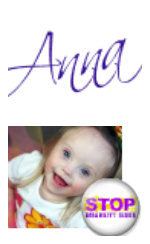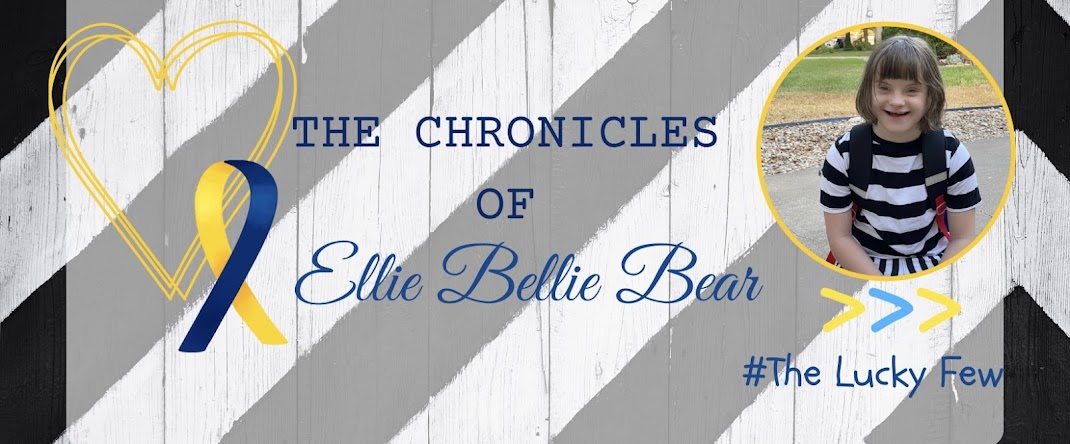Ellie came into the world relatively fast. I only had to push a whopping 6 times and she was out, screaming like the little banshee as though she was saying "how dare you disrupt my peaceful slumber?!"
As a first time parent, I was completely new to caring for a newborn. I had experience babysitting and I had experience in working with very fragile preemies as a registered nurse. I knew how to hold a baby and how to change a diaper. I did not know how to read the different cries, wake up frequently in the middle of the night and then function all day, or how to handle the amazing surge of both anxiety and love that flooded through my mama bear veins. I also felt that I didn't know how to take care of a child with special needs.
Upon telling my parents that Ellie was diagnosed with Down syndrome, my Dad reacted rather interestingly. Or so I thought. I mean, my Dad is my dad and all daughters think their daddies are a little goofy. Yet here on the phone, my father said something what struck me as really odd at the time "Well, you will just take her everywhere with you. You will take her on your vacations. She will do all things as a family with you." I thought "well of course she will do everything with us!"
My father's youngest sister was born in 1958 with Down syndrome. This was a time where most children with disabilities were sent away to institutions. They were not typically seen outside the home. Yet, my grandparents shunned this idea and they did exactly what my father told me to do with Ellie. They fully included Peggy in every single aspect of their lives and in their other children's lives. Peggy went out *gasp* in public with the family. She went on vacations with them. She went out to eat with them. She did do everything with the family. My grandparents' incorporating aunt Peggy into every aspect of their lives was all very taboo up until 30 or so years ago. Sadly, many people, especially those in Eastern Europe and many even in the U.S, believe that institutionalizing those with Down syndrome is still a common practice. Now, I understand what my father was telling me.
My experience with Down syndrome started in my early years and I never even thought to hide away my little girl, but I did have other preconceived notions. Growing up around Aunt Peggy did not ensure that I didn't buy into all the myths and stereotypes surrounding designer genes. I had relatively limited experience with children with Down syndrome. There were no children with Ds in my schools and therefore, the only children with Ds I ever came into contact with were little babies in the PICU after their cardiac surgeries.
As I address incorrect, preconceived notions that I bought into surrounding Down syndrome, I will reference my Aunt Peggy frequently. This does not mean all people with Down syndrome are this way. Just like everyone else in the general population, people with Down syndrome are individuals with characteristics and strengths that are unique to them. I discuss Peggy because she was my first and is now my oldest tie to the Down syndrome community.
- People with Down syndrome are always happy.
- Yes, yes, I did indeed fall prey to the "but they're so happy all the time".
- This myth was dispelled rather quickly. My daughter can throw an epic temper tantrum that have grown men running for cover. She cries when she is hurt or tired. She will throw food and toys when she is angry. She is perhaps the sassiest toddler I have ever encountered. I would love for her to be always happy, but that is asking for the impossible.
- People with Down syndrome are difficult to understand
- People with Ds do have difficulty speaking due to the low muscle tone (hypotonia) of the tongue, cheeks, and lips. Their mid-faces tends to be smaller. All of these physical characteristics can lead to difficulty in producing speech and some people may sound as though they have a lisp. This does not mean people with Ds cannot talk nor does it mean they are difficult to understand.
- My aunt, however, is very difficult to understand if you are not around her all the time. However, I know of others with Ds that can speak clearly with excellent pronunciation and enunciation. I believe as with all people, speech varies from person to person.
- My little Ellie has trouble saying actual words, but trust me when I say anyone can understand her. Her SCREAM speaks volumes and people from here to Europe to Asia all understand that she is angry. Her infectious smile communicates that she is happy. Her emphatic waving followed by blowing kisses lets everyone know within a 5 mile proximity that she is saying "hi".
- People with Down syndrome cannot get married
- There are many individuals with Ds who have tied the knot in recent years. Monica and David are a fine example.
- Even if there is no matrimonial bliss, there is definite dating happening in the Ds community. Aunt Peg had the same boyfriend for many years.
- People with Down syndrome live with their parents or in group homes.
- Again, not entirely true. There a adults with Down syndrome who do live with their parents, but I also have some personal friends from college who are still living with their parents. What is the big difference? None! There are those with Ds who live in apartments, who have roommates, or who do live in group homes. My aunt is thriving in a group home that is set up like a college campus. She has her own room in the female building. Across the way is the male building. She LOVES where she lives. She has also lived with my grandmother at times and she even lived in an apartment with a roommate.
- There are so many options and it really depends on each person's abilities and preferences. Living independently, living with supervision, living in a group home, and living with parents are all options.
- People with Down syndrome tend to bag groceries
- I recommend this post: I don't want her to be a grocery bagger
- Do not ask me why I assumed this.
I am certain that there are still many myths that I hold onto about Down syndrome and disabilities in general, but my daughter is showing me that she is a unique individual with definite likes and dislikes, strengths and weaknesses, feelings and personality. I am continually learning from Aunt Peggy and from Ellie and perhaps, hopefully, other people are learning from them as well.
Today's post is a part of a Disability Blog Hop hosted by With A Little Moxie with a topic of "The Influence of Disability"








I thought they all bussed tables. Where did we get those crazy ideas. We have a Miss Sassy Pants in our house, too! Absolutely loved this post!
ReplyDeleteLove this post! thanks for sharing...she will do wonderful things and I likea toddler with some spunk! ;)
ReplyDeleteGreat post! I have not been good at keeping up with the blog hop!
ReplyDeleteI loved hearing about your experience with your Aunt! Sass is right! I'm beginning to think "Sass" might come with the extra chromosome too!
ReplyDeletelove :) Do you get to see your aunt very often?
ReplyDeleteWhat an awesome post! I will definitely be back to read more of your blog...
ReplyDeleteAll the contents you mentioned in post is too good and can be very useful. I will keep it in mind, thanks for sharing the information keep updating, looking forward for more posts. Thanks
ReplyDeleteOnly Child